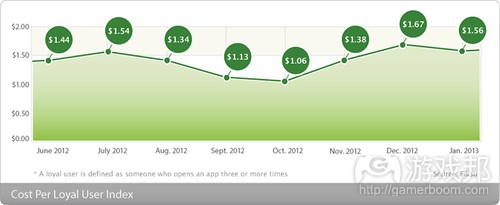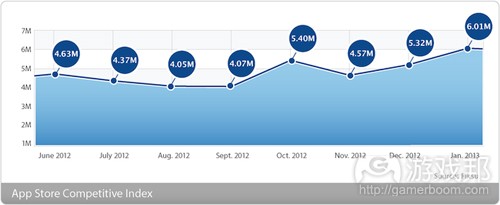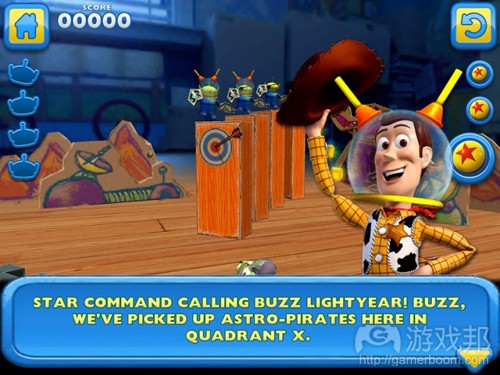每日观察:关注开发者对HTML5的支持率(2.28)
1)Fiksu最近报告显示,2013年1月份iOS忠实用户获取成本已从去年12月份的1.67美元降至1.56美元,但比去年同期(1.14美元)增长37%。
美国前200名热门免费iPhone应用日均下载量从12月份的532万次增长至1月份的601万次(游戏邦注:移动分析公司Flurry曾指出2012年圣诞假期iOS和Android设备激活量达5000万部,应用下载量为17.6亿次)。
2)据socialgamesobserver报道,前Zynga波士顿工作室(已于2012年10月关闭)的5名成员最近成立了一家独立工作室Proletariat,并将于下周推出其首款移动游戏《Letter Rush》。
该工作室首席执行官Seth Sivak表示团队成员包括来自Insomniac Games、Turbine和Harmonix等公司的游戏设计元老,主攻方向是移动和平板电脑游戏开发领域。
3)移动交互服务公司Tyntec最新报告显示,应用开发者应重视短信营销手段,开发者可通过短信形式与用户联系、交流,这有助于培养用户忠诚度、留存率和粘性。
Blue Lion公司推出的社交检索平台Qeep就是有效利用短信营销手段的典型,他们通过短信与200多个国家/地区的1600万用户建立联系,并以此重新激活用户对应用的访问行为,其营销活动还产生了超过10%的反应率。
4)据venturebeat报道,迪士尼移动最近推出基于迪士尼皮卡斯动画电影《玩具总动员》的最新游戏《Toy Story:Smash It!》。
这款3D物理益智游戏已在苹果iTunes App Store(已有13万4789款活跃游戏)上线,要求玩家爆破砖块,弹球等任务,共有60个关卡,售价99美分,并将在Google Play推出Android版本。
5)据games.com报道,针于投资者质疑Zynga在博彩领域发展空间一事,Zynga首席执行官Mark Pincus最近表示,Zynga无意吸引资深赌客(因为他们可以从真正的赌场获得乐趣),但更有兴趣吸引那些非赌客用户,正如开发商都喜欢制作吸引之前并非游戏玩家群体的用户一样(例如《FarmVille》就吸引了大量之前从不玩游戏的群体)。
他称Zynga并非意在赢得资深赌客的公司,他们瞄准的是大众用户市场。
6)Kendo UI最新针对5000名开发者的调查结果显示,有50%开发者已在使用HTML5开发内容,还有90%有意在2013年使用HTML5技术。
仅有15%开发者仍选择仅开发原生应用,Kendo UI指出多数开发者对Facebook去年宣布将放弃HTML5技术的消息无动于衷,而实际上Facebook也并未彻底抛弃HTML5,只是改变了对该技术的用法,新款Facebook应用就包含大量HTML5技术,Facebook也表示HTML5有利于更快开发和维护多款应用。
使用HTML5开发办公类应用的开发者占比54%,开发实用型应用占比38%,开发消费者应用占比35%,开发社交网络占比18%,开发游戏占比8%。
有66%开发者有意针对Windows 8开发HTML5应用,将近半数开发者有意针对谷歌Chrome操作系统开发应用,还有三分之一打算针对Firefox操作系统开发HTML5内容。
78%开发者称HTML5现在已经适合开发移动应用,68%认为该工具适合所有开发者创建任何应用;仅有24%开发者认为HTML5只是一种炒作。
尽管iOS仍是开发者首选的平台,但不少人认为这是一个难度很大的开发平台。并且,从开发难度上看,iOS排名仅次于因此而声名不佳的黑莓——64%开发者认为黑莓平台极具挑战性,认为iOS很困难的开发者比例则是59%。
相对之下,有半数开发者认为Windows 8是个容易开发内容的平台,有26%认为Android很容易开发内容,但也有29%认为Android平台开发难度很大。
(本文为游戏邦/gamerboom.com编译,拒绝任何不保留版权的转载,如需转载请联系:游戏邦)
1)Fiksu: Holidays still impacting mobile advertising, iOS downloads increased by 13% in January
Scott Reyburn
User acquisition and marketing company Fisku today reported a cost per loyal user decrease of 7 percent from $1.67 in its December 2012 Index to $1.56 in its January 2013 Index. The Boston-based company defines a loyal user as a person who will open an app at least three times. Compared to January 2012′s average cost of $1.14 per user, January 2013′s user acquisition cost is up 37 percent year-over-year, but the drop from December 2012 to January 2013 by 7 percent was not as dramatic as the drop from December 2011 to January 2012 by 59 percent, which fell from $1.81 to $1.14 per loyal user.
The company, which measures the average aggregate daily download volume of the top 200 free U.S. iPhone apps, saw mobile app downloads increase by 13 percent from 5.32 million daily downloads in December 2012 to 6.01 million downloads in January. With monetization company Flurry which saw 50 million iOS and Android device activations and 1.76 billion apps downloaded during Christmas week last year, Fiksu says the high trend of user activity and app discovery continued into January.Fiksu January 2013 2
CEO Micah Adler says Fiksu’s January Indexes are early indicators of the “mainstreaming of mobile advertising,” meaning marketers emphasizing value over volume by spreading their budgets out for maximum profit, especially to mobile advertising campaigns.
“We expect brands to allocate more dedicated spending to mobile advertising campaigns in 2013 and to only get savvier about aligning seasonal spending to the ebbs and flows of user acquisition costs,” he says, in a statement.(source:insidemobileapps)
2)Former Zynga Boston developers launch new studio: Proletariat
By Camilla Noon
In October 2012 social game developer Zynga unexpectedly shuttered Zynga Boston. Four months on, developers from the now-defunct studio are launching their first game as a new independent studio, Proletariat.
Proletariat CEO Seth Sivak said the team of veteran game designers who have worked at companies like Insomniac Games, Turbine and Harmonix have decided to stay in the mobile and tablet game development space for the same reason they moved into social games to begin with: they want to make games that people will talk about for all the right reasons.
“That was the appeal for us,” says Sivak, who was working at Conduit Labs with Proletariat’s founders before Zynga acquired the studio in 2010. “It was all about making really, really big games that could have tons of users and become something that was beyond what a boxed title could do. Something people talked about at their kitchen tables around dinner.”
Sivak says that after years of working on blockbuster-sized games that required three to five year development cycles and had niche audiences, the developers wanted a new challenge, and that challenge was social games.
“Social games were a new, interesting way of designing,” he says. “It was a totally new opportunity to create something that could at the time have cultural impact. When you look at a game the size of FarmVille, at one point it had 32 million daily active users — it’s hard to say there’s a game that makes more of an impact on culture as a whole.”
The team of developers who came to form Zynga Boston created the Indiana Jones Adventure World Facebook game. With Zynga Boston now behind them, the five senior members of the studio have formed Proletariat, an independent studio that has its sights set on mobile and tablet games that will get people talking.
Game created by these developers when at Zynga Boston
Sivak says the team of five brings with them a wealth of experience both from their time working on AAA games and at Zynga, and their experiences have taught them what to do and what not to do.
“We learned how to run games as live services — that was without a doubt our most valuable lesson learned from Zynga,” Sivak says. “That’s the thing that Zynga does extremely well, and it’s the thing people often forget about —Zynga games go on and on, and they don’t lose that many users. It’s a shock when Zynga closes a game, which is not true for any other social game developer.”
Sivak says Proletariat has also learned that it doesn’t want to follow the big studio way of greenlighting and launching games, which he says involves too much red tape and hoop-jumping.
Proletariat’s focus is on creating more “core” experiences for the changing mobile and tablet audience, and the team intends to do that through a back-to-basics approach of prototyping and iterating games they feel are fun.
It’s early days for the new studio and its debut mobile game, Letter Rush — a twist on the find-a-word mechanic where players have to find all the letters of a word in a jumbled heap in the time it takes for the word to float across the screen— is out next week. Sivak says he’d be lying if he were to say he believed there was no way the new studio could fail. Launching a new studio puts the team in a position as precarious as working for a company that could close their operations without notice. The difference, he says, is the fate of Proletariat is now in its own hands.(source:socialgamesobserver)
3)Report: App developers send texts to power revs and user engagement
by Zen Terrelonge
SMS allows them to communicate, connect, and curate.
IM services like BlackBerry Messenger and WhatsApp have garnered a massive following, but mobile interaction specialist Tyntec’s new report details the importance of text-based marketing.
The study says SMS allows app developers to communicate, connect and curate their audience, which are three prime ways to encourage user loyalty, retention, and engagement. Freemium gaming is a notable concern, with developers only able to profit if they can secure an audience with in-app purchases.
Blue Lion’s Qeep social discovery platform is a prime example of effective SMS-based marketing, using texts to stay connected with 16m users in 200 countries. It’s also produced a solution to reactivate users that haven’t accessed the app for an extended period, and the campaigns generate slightly over a ten per cent response rate.
Christian Schulte, co-founder of Blue Lion, said: “SMS is the only technology that’s truly harmonised between all mobile operators globally. This reach means that an app developer with global scale can ensure consistency across markets, driving increased engagement and lower cost and complexity.”
Steve Liddell, CEO, Tyntec, said: “Historically, app success was all about driving new downloads and business models were about app prices. Now, more than ever, the market is rapidly becoming dominated by freemium models.
“In this environment the focus is not just on grabbing consumers’ interest in the short term, but on keeping them engaged and re-engaging them when they look like they’re losing interest.
As the examples in this paper demonstrate, SMS is a vital part of the mix for this sort of marketing outreach.”(source:mobile-ent)
4)Disney Mobile launches Toy Story: Smash It! game on app stores
Dean Takahashi
Disney Mobile has had a string of hits on the iOS and Android app stores. And it shooting for another one with the launch of its newest game Toy Story: Smash It! Based on its classic Disney Pixar animated film Toy Story, the game is a 3D physics-based puzzle title that immerses the player in the world of toys.
New game launches are the norm on the Apple iTunes App Store, where there are already more than 134,789 active games. But Disney has had a remarkable string of No. 1 hits like Temple Run:
Brave and Where’s My Water? While most other mobile game companies fret about how to get their apps discovered, Disney has so much brand power and marketing activity across big entertainment channels that it has a golden touch in mobile. The company creates titles that rise to the top and beat other unknown brands.
But the games have to be good too. Toy Story: Smash It! lets players blast bricks, bounce balls, and deal with rainy-day boredom along with Andy’s beloved toys. Players help Buzz Lightyear knock down his alien friends with bouncy balls all over the room. The title will have four episodes and 60 levels, culminating in a fight with the evil Zurg. Players can play as Buzz, aim and throw objects, and enjoy encounters with Woody, Rex, Hamm, and Jessie. The title will sell for 99 cents and run on the iPhone, iPod Touch, and iPad. It will also be on Google Play.(source:venturebeat)
5)Zynga CEO Mark Pincus wants to make a gambler out of everyone
by Joe Osborne
There’s no doubt that Zynga is hot on online gambling, but doubt has been cast on whether the FarmVille maker would succeed. Company CEO Mark Pincus attempted to assuage investors recently at a Morgan Stanley conference in San Francisco, CNET reports, shedding light on Zynga’s approach to online gambling games. In short: Mass appeal equals mass dollars spent.
Zynga isn’t interested in the hardcore gamblers–they’re already well-served. No, Zynga is interested in those who aren’t gambling yet, just like the developer was interested in those who weren’t playing games yet with FarmVille. “It makes it more exciting than when you’re by yourself in an anonymous poker room,” Pincus said during the conference, according to CNET. “We’re not the company to win the hardcore real-money gamers,” he said. “But we think we are for the mass market audience.”
With games like Zynga Elite Slots and moves in the UK and Nevada, Zynga seems well on the way toward its goal. However, as it will be for all social game-turned-online gambling companies, the social game giant faces an uphill battle in the U.S. The success of online gambling here entirely relies on whether individual states allow it. It could be years before even half of U.S. gets on board, so if we were Zynga, we wouldn’t exactly bank on it to rake in the benjies.(source:games)
6)5,000 developers say HTML5 is real, it’s now, and yeah, it’s also the future
John Koetsier
HTML5 looks to be the overwhelming favorite development platform of choice for mobile developers, according to a new study by Kendo UI, which makes an HTML5 toolkit for mobile web development. Already, 50 percent of developers have developed in HTML5, and 90 percent plan to use the technology in 2013.
What about native-only solutions?
Only 15 percent of developers would go native-only when building an app for multiple platforms, a stat that might be a little shocking to those witnessed Facebook famously and loudly abandoning HTML5 development last year in favor of a faster, smoother, better native app experience.
“Most developers were not impacted by that Facebook decision,” Kendo UI EVP Todd Anglin told me yesterday. “One thing that gets overlooked often in the Facebook news is that Facebook hasn’t abandoned HTML5 at all … just changed their use of it.”
In fact, the new Facebook app includes a lot of HTML5, Anglin said, adding that Facebook has said that HTML5 makes it faster to develop and maintain multiple apps.
Developers who are actively using HTML5
HTML5 on the desktop
HTML5 on mobile is nothing new. But what about HTML5 on the desktop?
It turns out that HTML5 could be huge on the desktop, with 66 percent of developers interested in developing HTML5 apps for Windows 8, almost half interesting in building apps for Google’s Chrome OS, and another third thinking about developing apps for the emerging Firefox OS.
“It’s the final frontier for where HTML5 should go,” Anglin said. “And it begs the question … why don’t we think of this as an equal option for a PC?”
On a desktop PC, HTML5 would not be limited by a relatively puny mobile processor, either, meaning that developers could do even more with HTML5 video and interactivity. What that means, Anglin said, is that you could have a complete unified strategy for all mobile operating systems and desktop systems at one time … that uses the same codebase and the same developer skill set.
That’s fairly mind-blowing, considering where we’ve come from.
HTML5 for the desktop
The ‘one + HTML5′ strategy
A growing strategic solution to the challenge of multiple platforms seems to be the “one + HTML5″ plan, in which developers build one app for a key target platform in native code — although it may also contain some HTML5 — and one app for all the other desired-but-not-core platforms in HTML5.
Typically, the “one” is iOS, although it could also be Android, and the HTML5 solution is for BlackBerry, Windows Phone, and any other desired platforms.
Still, given a choice, most developers would either do a pure HTML5 app for all platforms, or a hybrid app: HTML5 core, with native wrapping on each targeted platform.
Native vs HTML5 vs Hybrid apps
The hype cycle — HTML5 isn’t overhyped anymore
Only a quarter of developers now believe that HTML5 is overhyped, while almost half strongly believe it is not.
“Developers are now beyond the hype curve,” Anglin said. “Even though some developers think that HTML5 is overhyped, that doesn’t mean they don’t think it’s a platform that is both usable and important.”
78 percent of developers now say HTML5 is appropriate for building mobile apps, and 68 percent say it’s appropriate for all developers building any kind of app.
While iOS is a top platform, developers say it’s difficult to develop for. In fact, iOS ranked just under the notoriously challenging BlackBerry for development difficulty. Sixty-four percent of developers said that BlackBerry was challenging — and having developed two apps for the platform myself, I agree — while 69 percent said that iOS was difficult.
Objective-C is not the newest or widest-known language in the world, of course, and Apple does put a few hurdles in developers’ paths as well.
In contrast, half of developers thought that Windows 8 was easy to develop for, and Windows Phone 8 was not far behind. Android, meanwhile, was split: 26 percent said it was very easy, while 29 percent said it was very hard.
“What’s surprising to us is not that it’s difficult, but that’s it almost twice as difficult to work with as Android,” Anglin said. “We would have thought developers would rank
Android equal to iOS or even harder, since there are so many more devices in the Android ecosystem.”(source:venturebeat)
上一篇:探讨游戏艺术和游戏设计的美学意境















































